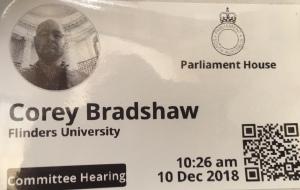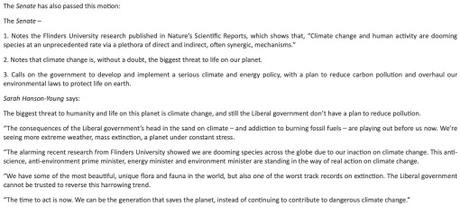
My entry badge today to the South Australian Parliament (sorry for the shitty reproduction, but it’s a shitty photo of a shitty photo)
I’ve often commented on it over the years, as well as written about it both in my latest book, as well as featured it here on CB.com, that little of the conservation science we do appears to reach the people making all the decisions. This is, of course, a massive problem because so much policy that affects biodiversity is not evidence-based, nor do we seem to be getting any better at telling them how buggered our natural world is.
Even the Extinction Rebellion, or school kids screaming in the streets about lack of climate-change policies appears unable to budge the entrenched, so what hope do we lonely little scientists have of getting in a Minister’s ear? It’s enough to make one depressed.

It’s enough to make you reconsider and not bothering at all.
But! Despite my obviously jaded perspective, two things have happened to me recently that attest to how a little perseverance, sticking to your guns, and staying on message can reach the ears of the powerful. My examples are minuscule in the grand scheme of things, nor will they necessarily translate into anything really positive on the ground; yet, they give me a modicum of hope that we can make a positive difference.
The first event happened a few weeks ago after we did a press release about our paper on co-extinction cascades published in Scientific Reports. Yes, it got into a few big newspapers and radio, but I thought it wouldn’t do much more than peak the punters’ interest for the typical 24-hour news cycle. However, after the initial media interest died down, I received an e-mail from one of my university’s media officers saying that the we had been cited in The Senate (one of the two houses in the Australian Parliament)! An excerpt of the transcript is shown below (you can read the whole thing — if you could be bothered — here):

Yes, The Greens‘ Senator Sarah Hanson-Young from South Australia had actually cited our paper in The Senate in the morning session of 26 November. I’m pretty sure this has never happened before. Like I said, will it change anything? Who knows? But at least some politicians appear to be listening to us.
So, that was cool, but I think in reality the second event, which took place this morning, is potentially more influential. As some readers might recall, I recently wrote an overview essay about managing biodiversity in South Australia that accompanied the 2018 State of the Environment Report. After the press release, I was more than a little disappointed that no one seemed to take any notice; however, a week later a Parliamentary Officer of the House of Assembly of the South Australian Parliament e-mailed me to act as an ‘expert’ witness for a new inquiry that had been recently established — the ‘Overabundant and Pest Species Inquiry‘.

The roof of the South Australian Parliament (I was too self-conscious to attempt a photograph of the Inquiry itself).
Now, this itself is no big deal, because anyone can send in a submission to an Inquiry and be invited to say her bit in front of the Committee. But in this case, they invited me to speak without first having submitted anything in writing, and instead (I gather) decided to invite me to give my opinions after my overview essay was published the week before.
Well, I had my 20 minutes in the sun this morning at Parliament in Adelaide, and from all accounts and reactions, my words appears to have struck a chord. Again, I’m unsure if it will change anything, but it reminds me to remind you that yes, we can make a difference. Keep doing your good work, and eventually, someone will notice.
CJA Bradshaw

